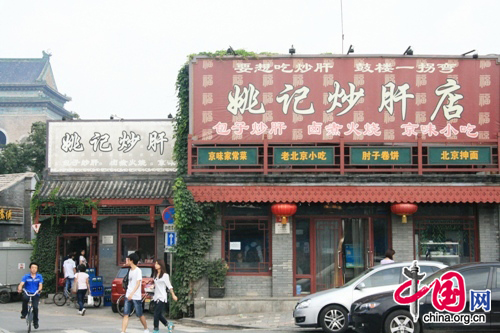Biden's $12 lunch is more PR genius than economic barb
- By Stuart Wiggin
 0 Comment(s)
0 Comment(s) Print
Print E-mail
China.org.cn, August 31, 2011
E-mail
China.org.cn, August 31, 2011
|
|
|
Yao's Fried Pork Liver, a traditional Beijing restaurant close to the Drum Tower, has gained increasing popularity after a recent visit by Joe Biden, the vice-president of the United States. [Photo by Lu Na/China.org.cn] |
U.S. Vice President Joe Biden created quite a stir earlier this month when he and his entourage graced the Yaoji Chaogan restaurant in Beijing as part of his official visit to China. The impromptu visit to the humble, no-frills restaurant, has seen Biden's visit labeled by various media outlets as 'Noodle Diplomacy'. A number of over-eager observers have also claimed that the visit was a carefully thought-out attempt to suggest that the yuan should continue to appreciate. However, the grounding for such a claim seems rather scarce, especially when you consider the political culture of America.
Biden and his entourage ordered a hearty meal, racking up a sizable tab of just over $12 (RMB79). For western observers, the restaurant visit is just another example of America's well oiled PR machine. The image of Biden opting for such a low-key venue has captured the attention of China's state media and the imagination of most onlookers. Public image is very easily influenced, and being 'of the people' has certainly helped to create a very specific opinion of Biden amongst casual onlookers within China.
Many of China's so-called 'netizens' have taken to their microblogs to laud praise on Biden for his choice of dining establishment. However, as part of the suspicion which has developed towards politicians and officials as a result of China's modern political culture, some have looked for an ulterior motive to Biden's 'Noodle Diplomacy'. American criticisms of an under-valued yuan have dominated headlines at home and abroad. America has decried the weak yuan as the cause of its manufacturing downturn, claiming that a stronger yuan would help to redress its uneven trade balance. Meanwhile, China has vehemently defended its currency's status, accusing America of trying to meddle in the affairs of other countries. Biden's impromptu lunch has provided both sides with ample ammunition for their arguments.
It's no secret that if Biden had ordered the same meal in America, it would have cost a lot more than $12. Some have therefore put two and two together and painted Biden's lunchtime adventure as a carefully planned attempt at criticizing the value of China's currency. However, it is in no way such an attempt. It is but a tiny example of America's sheer brilliance when it comes to public relations. This article makes no attempt at lofty definitions of possible attempts at generating soft power, nor does it claim that this was a conscious effort on Biden's part to develop such power. American politicians are simply very good at PR, as are American institutions and the press departments which exist within them.
Rui Chengang, the China Central Television editor and presenter, said it best: "American politicians are good at molding their public image. This is a product of the system." He went on to say that their ability to create positive publicity was "worth learning from." Rui's comments ring true in a country which has seen politicians endure much criticism during the first half of 2011.
The author is a news editor at China Radio International. He graduated from Oxford University majoring in modern history and politics.
Opinion articles reflect the views of their authors, not necessarily those of China.org.cn






